The virtual Conservative Party Conference took place – we’ve coverage of the relevant fringe events below; the Science and Technology Committee ran an interesting session on ARPA, and university adoption of the definition of anti-semitism is back on the agenda.
What next for HE policy?
Jonathan Simons of Public First writes Ambitious Minds for Research Professional aiming to provide insight into the Government’s thought processes behind their HE agenda. The quick read is illuminating (even if you aren’t a policy geek).
Technical education
The Lords debated the Lifetime Skills Guarantee and Post-16 Education on Tuesday (we mentioned Boris and Gavin’s announcements for this in the policy update last week). Debate followed similar lines as last week plus University Technical Colleges and parity of esteem were discussed.
Lord Storey triggered a chuckle in his enthusiasm for extra funding for FE colleges: My Lords, this is very good news. I do not have to sit on the Bishops’ Bench to say hallelujah. Later he raises: There is no mention of university technical colleges, which have done an excellent job. Does the Minister see an enhanced role for them?
Lord Baker of Dorking echoed this: I am very grateful for the mention of the colleges that I support, the university technical colleges. At the moment, they are by far the most able and successful technical schools in the country. We are having a record year in recruitment and we have incredible destinations. Last year, one of our colleges on the north-west coast of England produced 90% apprentices, which is absolutely incredible when the national average is 6%.
He continued: The trouble is that, since 1945, there has been a huge drive to send people to universities, which is good for social mobility but it means that graduates have had disproportionate esteem, disproportionate political influence and disproportionate reward compared with those who make things with their hands. This is the time when we have to elevate the intelligent hand: to train not only the brain but the hand as well.
Baroness Berridge (Minister for Schools): My Lords, I assure the noble Lord that there is no snobbery in the Department for Education; we want to promote parity of esteem for vocational and technical qualifications across our sector. The Prime Minister and the Secretary of State are behind this.
Maintenance Support
Meanwhile the Centre for Progressive Policy has published Beyond hard hats – What it will take to level up the UK and some of the recommendations chime with delivering the Lifetime Skills Guarantee. The report calls for a Learners’ Living Allowance to support those undertaking part- or full-time training, as an equivalent to maintenance loans available for higher education students, to be paid back under the same conditions upon employment.
HE at the Conservative Fringe
There was a Conservative Party fringe event: Back in business: what can modern universities do to support Britain’s recovery? (sponsored by HEPI and MillionPlus). Universities Minister, Michelle Donelan, was on the panel. The event discussed changes within the FE and HE, the recent Lifetime Skills Guarantee announcement, and how universities can provide quality education in a post-Covid world. Also: technical qualifications, up-skilling and re-skilling, the Augar review, and institutions’ roles within their local community.
The Education Policy Institute (and Sheffield Hallam University) ran Higher and further education in post Covid recovery: Competitors or Collaborators? Former HE minister Jo Johnson was on the panel along with the CEO of the Association of Colleges (David Hughes), the public policy editor of the Financial Times (FT), Sheffield Hallam university, Sheffield College and EPI.
The level 4 & 5 ‘regulatory jungle’ was discussed, FE & HE working collaboratively, the FT pointed out that the forthcoming demographic bulge meant there was no shortage of students to go around, and suggested that ensuring a blend of FE and HE was the best way to meet the rising need. Skills were discussed with Jo stating he’d pushed for both credit transfer and modular funding during his HE Minster tenure, but neither are easy to achieve nor implement well. He also called for the removal of the ELQ rule across all subject areas. You can read the rest of the session coverage in this summary.
Wonkhe report specifically on Jo Johnson’s speech: Speaking on an Education Policy Institute panel yesterday, former minister Jo Johnson reported that snobbery about further education was an “artefact”, and there was currently an “aggression” towards higher education in the media. He also noted he had experienced “push back” from some more established universities in developing a national credit transfer framework. TES has the story. The recognition of the media aggression was a welcome acknowledgement from a former minister.
There was also an event on engineering.
Education Committee – HE Minister
The Education Committee held two accountability sessions this week (these are a regular occurrence and question a Minister or senior public figure on the handling of current business). Colleagues interested in disadvantaged school children, catch up, county lines, and educational inequalities will be interested in the summary of the first session here (prepared by Dods).
The second session questioned Michelle Donelan, sadly it was more watery than juicy. She stated that she did not know how many students were currently under lockdown at universities in England instead highlighting that C-19 rates were still relatively low at universities. Donelan said that most students were abiding by the guidelines but that a minority were socialising in a way that was driving spikes in infection. She confirmed the Government was committed that all students could return home at Christmas and various measures were under consideration as to how this would be achieved. Recent sector press has speculated that the DfE were completely unprepared for the guidance the Secretary of State promised would be issued to the sector guiding institutions on how to achieve this. And Wonkhe have confirmed the DfE will launch a Covid-19 helpline for both institutions and students. Donelan was unclear if this would be an automated system or a real person on the end of the line. On the guidance Research Professional report that Donelan was reticent, stating it was being drawn up and will contain a “robust” Q&A session, but it is not quite ready for publication yet….but that one approach being looked at was the quarantining of students in the two weeks before the end of the winter term
Donelan also commented on the perennial fee refund topic stating it was a matter for individual universities, rather than the government, to determine whether students should receive refunds, however she stated that online and blended learning was working well. She also took a strong stance and stated that universities that had not yet adopted the IHRA definition of anti-Semitism would ultimately be forced to do so by Government (more on this below).
Wonkhe have a blog covering the Committee session and considering some of the aspects arising within a sector context. David Kernohan writes: the hearing was just more evidence that DfE is not on top of the situation when it comes to keeping students safe. Guitarists will find fine resonance with the beginning of the blog.
Drop the boo boo
Labour didn’t want to drop the Secretary of State’s mistaken statement last week (that £100 million was available to universities for digital access – it isn’t, it’s for schools) and raised a Point of Order because the mistake hadn’t been corrected in Hansard. Gavin Williamson managed to weasel out of outright confirming he’d got it wrong instead he said: As the House will know, the Government have made available more than £100 million for electronic devices. Those youngsters who are in care and going on to university can access that funding to enable them to have the right type of devices, whether that is a laptop or a router. If a student’s family circumstances change while they are at university, they can go to the Student Loans Company to have their maintenance grant re-assessed. Although the original record hasn’t been amended Kate Green has raised this enough now to have made her point about Gavin’s mistake.
Anti-Semitism Definition
The House of Commons debated universities (not) adopting the IHRA definition of anti-Semitism on Tuesday. Ahead of the debate the Telegraph reported that only one fifth of universities have adopted the IHRA definition of antisemitism.
Sarah has added some key snippets from the full debate below. You’ll spot from the summary that parliament were disdainful of the reasons the sector has given for not adopting the definition.
- …in January this year, the Secretary of State for Housing, Communities and Local …(Robert Jenrick) wrote to all universities demanding that they adopt the IHRA definition of antisemitism or face funding cuts…. This debate—and, indeed, previous requests by Members to universities—is intended not to be a stick with which to beat the higher education sector… (Christian Wakeford)
- I am disgusted that we stand here today, in 2020, to condemn the ways in which universities have not only refused to engage with or listen to students…The institutional hijacking of freedom of speech that is currently being used as a façade for universities and professors to scurry behind is appalling. (Jonathan Gullis)
Vicky Ford (Parliamentary Under-Secretary of State) stood in for Michelle Donelan to give the ministerial perspective on the debate:
- Universities have a big role to play. We expect them to be welcoming and inclusive to students of all backgrounds, and the Government continue strongly to encourage all higher education providers to adopt the IHRA definition, which would send a strong signal that higher education providers take those issues seriously. However, they are autonomous institutions and that is also set out in law. As such, the decision on whether to adopt the definition rests with individual providers… The Government will continue to call on providers to adopt that important definition. It is a decision for vice-chancellors, but I urge them all to listen to their staff and students, as well as to the wider community and, indeed, our proceedings.
- Without doubt, the university experience of many Jewish students is overwhelmingly positive. However, the number of antisemitic incidents in the UK remains a cause for concern…in the first six months of this year, the number of incidents of antisemitism involving universities rose by an alarming 34%…That is absolutely unacceptable and shows how much further the sector has to go to tackle the issue.
- Our universities should be inclusive and tolerant environments. They have such potential to change lives and society for the better. I am sure that our universities are serious in their commitment to tackle racism and hatred, but much more work remains to be done
At the end of this week’s Education Committee session Chair, Robert Halfon, stated:
- It was “strange”, Halfon said, that so many universities had not adopted the definition when they were so quick to “pull down statues” that were deemed offensive. He posited that many institutions “seem to turn a blind eye” to antisemitism.
- There was no lack of clarity in Donelan’s response to this. “I want every university to adopt this definition. So did my predecessors, who have written several times to universities on this matter.” Williamson had also written, she said, but it had “not shifted the dial”.
- “We are not seeing enough…universities adopting the definition and it is simply not good enough,” Donelan continued, adding that she and her department were looking at “other measures…to make it happen”.
- “I urge universities to do this,” she said, or the Department for Education will find ways “to ensure that you do so”.
Research news
ARPA – The Science and Technology Committee held a particularly juicy session on the potential new ARPA style research funding agency. A summary of the two sessions is here and the full session content will shortly be available here.
In the first session the witnesses thought it right that Government should set broad strategic goals and research direction for the agency, particularly those centred on specific challenges (such as health, energy and defence policies). A witness suggested there was no need to wait for consultation outcome on ARPA – that set up could run parallel. Neither witness felt UKRI should run ARPA – that it should sit at a high Government cross-sector level, and that UKRI don’t currently have a challenge-setting role. Walport railed against this statement in the second session stating UKRI could be guided towards a more ARPA-like model without the need for a new body by giving UKRI more freedom and money to work on specific challenges.
The second session witnesses were Sir Mark Walport (UKRI’s previous CEO) and Jo Johnson (previous Universities Minister). Both were responsible for setting up UKRI and both were concerned that an ARPA body would be beneficial. Johnson stated a new body could work but it would have to complement the existing organisations. Furthermore, that there was still no clarity over what purpose a UK ARPA would serve and a new green or white paper should establish this. Overall, he was in favour of ARPA becoming a part of UKRI. Hosting ARPA outside UKRI could fragment the coherence and oversight of the UK research sector. The geographical location of where to locate ARPA was discussed.
Do read the summary here as the above only touches on part of the discussion.
Life Sciences – Two Conservative party fringe events touched on Life Sciences. Here are the summaries:
The Future of Life Sciences – panellists spoke on levelling up in the context of life sciences and the future impact that the sector could have the on the health and wealth of the UK. Data access within the NHS and speeding up access to new and innovative medicines were also mentioned.
Healthy Boost: Putting Life Sciences innovation at the heart of Levelling Up – panellists discussed the need to effectively integrate the life sciences in any future plans to rebuild the UK economy. The unequal effect of Covid on areas was discussed, alongside improving health outcomes and living healthier lives through prevention and Government investment. Manufacturing within the life sciences was mentioned alongside maintaining progress with medicines and medical devices. Universities were mentioned as anchor institutions.
Research Professional also cover the Life Sciences sessions.
REF Review – UKRI have publicised the REF Review which will consider researcher’s perceptions and experience in preparing and submitting to REF 2021. It aims to understand attitudes towards REF 2021 and the affect it has on the academic environment. It also intends to capture views on the challenges and opportunities; whether REF is a driver of research behaviours and culture; and reflection on the practical preparations for REF 2021 at the institution, including lessons learned and changes from REF 2014.
REF Modifications Survey – During lockdown REF was put on hold while new dates were agreed and a survey proposed modifications to the REF exercise. REF have published the summary of the 164 responses to the survey which examined the appropriateness of the modifications for outputs, impact and the environment. A majority of respondents were happy with the modifications although many felt further detail was needed.
REF have also updated information on:
Global Research – Wonkhe tell us about the Wellcome Trust’s Global Research report:
- The Wellcome Trust has released a new report – “The UK’s role in global research”. Among 24 recommendations to government, it calls for the full implementation of the BEIS R&D Roadmap, an increase in QR and other funding that promotes research flexibility, and measures to improve the experience of international researchers and collaborators in working with and in the UK.
- Research Professional also covered the report (from half way down this link): The terms ‘science superpower’ and ‘Global Britain’ are now used frequently by the government as a shorthand for its ambitions for research.
- International collaboration is not restricted to universities…and must also hold for industries with a strong research focus, such as the pharmaceuticals and aerospace. This is how Global Britain will stay competitive.
- The UK must also be strategic and not waste resources on duplicating infrastructure that is available elsewhere. The country should use its reputation in science “for good”, combining research and diplomatic strengths to work with multinational organisations such as the UN, the World Health Organization and the G7.
- To put it bluntly, if not upfront because the reference appears 10 pages into the report: “Full association to the EU’s Horizon Europe research programme must therefore be at the heart of the research strategy for Global Britain.” However, the country should also forge partnerships beyond Europe, says Wellcome, and this could be financed out of quality-related funding dedicated to international collaboration.
- The research funder wants to see the government “commission an ‘international’ equivalent of the Department for Business, Energy and Industrial Strategy’s R&D Roadmap that sets the overall vision for Britain’s place in the world for research. This should become the ‘North Star’ for government decision-making, based around clear goals.”
- There is a lot to unpack in the Wellcome report, including the idea of a “single front door” for investment in UK science; bilateral funding schemes; and making the UK a champion of “regulatory diplomacy”. The funder wants to see the cost of visas reduced for researchers and provision for research collaboration written into free trade agreements.
Postgraduate Research Students – UUK, OfS, UKRI and Vitae have published their collaboration – Supporting mental health and wellbeing for postgraduate research students which consider the 17 projects addressing PGR wellbeing that were supported by Catalyst funding. They describe the programme reach: The 17 successful projects covered a wide range of activities targeted at PGRs and supervisors, including workshops, mentoring programmes, peer networks and training embedded into induction events. Co-production was a positive theme, with 171 PGRs directly involved across 11 projects… A variety of resources have been developed for use by the sector available on the OfS website: these range from training materials to wellbeing apps, blogs, online hubs and videos… Fifteen projects have provided case studies that outline their activities, impact and challenges.
Two-thirds of the projects reported improved mental health from their PGRs involved including that PGRs were more aware of how to support and improve their own mental health, and had improved knowledge of where to get help and support. You can read more on the projects here, and the recommendations are on pages 8-9. The report concludes that while the quality of the supervisory relationship is key, all university and college staff have a part to play in supporting the mental health and wellbeing of PGR students.
This week’s research related parliamentary question:
Areas of Research Interest to policy makers
The Parliamentary Office of Science and Technology (POST) have released a new opportunity for research colleagues:
In April POST ran a survey of experts on the COVID-19 outbreak expert database that resulted in the publication of syntheses about the future effects of COVID-19 in different policy areas. From this survey POST developed Parliament’s first Areas of Research Interest (ARIs) which are lists of policy issues or questions that policymakers are particularly interested in.
Currently only the ARIs which are linked in some way to Covid have been released. However, they are not all health based and touch on a range of themes from Crime, economics, inequalities, trade, supply chains, mental health, education, sustainability across several sectors, and so on. Do take the time to look through the full question list to see if it touches upon your research area. Non-researcher colleagues can share the list with academic colleagues within their faculty.
Alongside the publication of the ARIs is an invitation to experts to add current or future research relevant to the topics to a repository that Parliament may use to inform future policy making and Parliamentary work. Research with relevant research across any of the disciplines are invited to submit their work.
BU colleagues are strongly encouraged to take advantage of this rare opportunity to present their research to policy makers The Policy team is here if you need any help.
R&D Place Advisory Group
The Government have announced the R&D Place Advisory Group that will advise Ministers on the R&D places strategy which will build upon the R&D Roadmap and deliver the levelling up strategy across the public, private and voluntary sectors. The press release states that the aim is to build on local potential so that all regions and nations of the UK benefit from a R&D intensive economy. The Place Advisory Group support this by:
- proposing, challenging & testing potential policy options to make the most of R&D potential to support local economic impact in areas across the UK, including how best to increase the place focus in public R&D investment, factor place into decision-making across the R&D system, and foster greater local and national co-creation and collaboration to make better decisions on R&D
- contributing to the evidence base, including identifying priorities for long-term development
- exploring other relevant issues as requested by the Minister
The press release also states the group will advise the ministers in confidence. So proceedings may be hard to come by.
The group will be chaired by Amanda Solloway as Minister for Science, Research and Innovation. You can read her speech launching the group here. The secretariat function will also be provided by her department – BEIS. The group is expected to meet monthly while the Government develops the place strategy.
Admissions – Level 2/3 Exams
In Scotland the National 5 exams are to be cancelled for 2021 and replaced with teacher assessments and coursework. Higher and Advanced Higher exams will go ahead but will commence 2 weeks later than usual on 13 May. The BBC explain it as: like using coursework and tests for GCSEs while carrying on with slightly later exams for A-levels.
Scotland’s Education Secretary John Swinney stated that going ahead with all exams during the continuing Covid pandemic was “too big a risk”…it couldn’t be “business as usual” for exams but also “there will be no algorithm”. And if Highers cannot be taken, there would be a contingency plan to use grades “based on teacher judgement”.
There are rumours the Government is less certain that exams will go ahead in England. This week they stated universities could start later in Autumn 2021 to accommodate a delay to A level exams. An announcement from the Government on exams is expected later in October. This was confirmed in response to a Parliamentary Question calling for clarity before students submit their UCAS applications. Donelan also confirmed a statement was forthcoming. During her Education Select Committee hearing when she commented that it would be inappropriate if she were to pre-empt and “steal his [Williamson’s] thunder” by making any announcement. And on potential disruption to the start dates for the 2021-22 academic year, the minister added that “if term time needs to be moved slightly to accommodate any potential change in examinations, that is something that can be done quite straightforwardly”. (Source.)
In their article the BBC pose the two key questions:
- How can exams be run fairly when so much teaching time has been lost because of the pandemic?
- And how do you make a definite plan for such an indefinite situation – where it’s impossible to know how much more disruption might lie ahead?
Concluding that the Government really does need to get its skates on!
International
Wonkhe report that: Government information on sponsoring an international student has been updated to reflect the new student visa route. There’s also detailed technical guidance on the new route, and a guide for sponsors with material on English language requirements, certificates of sponsorship and record keeping provisions.
UUK also blogged on the topic: Government must act now or risk losing European students for years to come outlining 5 steps they want policymakers to adopt to stabilise demand for UK HE:
- Continuing to promote the new student route so that all international students are aware of the changes being introduced. This is particularly important for EU / EEA students.
- Improving and extending the Study UK campaign into key markets in Europe by coordinating existing campaigns currently in European markets and increasing investment in Study UK to £20 million a year.
- Providing targeted financial support for EU students such as through an expanded or newly developed EU scholarship offer.
- Lowering immigration route application costs so they are in line with the UK’s international competitors.
- Committing to continually reviewing immigration requirements in light of the Covid-19 pandemic
Disability
The Higher Education Commission convened by Policy Connect have published Arriving at Thriving – Learning from disabled students to ensure access for all. It highlights that despite higher numbers of disabled students accessing HE the barriers they face when they get here are still numerous and unacceptable in today’s inclusive society. The report makes 12 recommendations to improve disabled students’ experience of HE and have a positive knock on effect on their attainment, continuation and graduate outcomes. The report states:
- Many of our findings make hard reading, and we cannot shy away from the fact that our evidence demonstrates an unhappy situation for many disabled students. Much progress has been made over the past few decades… However, our findings make clear that the road to progress has not ended, and it is vitally important to continue to call attention to the needs and experiences of disabled students.
- There are numerous practical changes that HEPs can and are implementing themselves to improve disabled students’ experiences…the focus of the majority of our recommendations is on what the government and the Office for Students can do to create and ensure improvement across the HE sector.
In setting out the key information here we focus on what is lacking, however, the report contains case studies and examples of success too aiming to share and spread good practice throughout the sector.
Key findings:
- Teaching and learning isn’t accessible enough – e.g. regularly being physically unable to get to or sit in lecture theatres or other academic spaces; unable to access learning materials; not receiving lecture capture where it has been promised; and not receiving other reasonable adjustments set out in their support plans, including adjustments to assessments. Student support services professionals are frustrated at the lack of change and adjustments they can enact within their institution – and not for lack of trying. Some students reported they felt there was no accountability, including at senior level, for ensuring access to learning.
- The bureaucratic burden of applying for funding and support is too much – the Disabled Students’ Allowance admin and timeliness was particularly criticised. Complaints processes were also seen as working against some disabled students. Funding doesn’t cover enough of the additional costs a disability entails when studying at HE level.
- The lack of accessibility occurs across social activities, clubs and societies too. The report finds there is a widespread lack of awareness or care among the wider student cohort for the existence of disabled students and their needs. Although some Students Unions are recognised for their awareness and culture changing work.
- Disclosing the disability to the HE institution remains a barrier which impedes the transition to HE.
The report concludes:
All of our twelve recommendations – and we could have made many more – require implementing in their own right if we are to achieve lasting change. The ideal would be for this to take place as part of the system transformation we set out in recommendation five – for the government to create a new system to support disabled people from the classroom to the workplace.
Former HE Minister Chris Skidmore, who set up the Disabled Students Commission in 2019, blogs for Wonkhe to launch the HE Commission’s report. He states:
- This report provides welcome evidence for the Disabled Students’ Commission’s work, not just by illuminating the obstacles that exist, but also by promoting the wealth of good practice already taking place in the sector. During this time when it has become necessary to rethink modes of higher education delivery, the sector must harness the opportunity to embed accessibility into course design, and to make consideration of disabled students’ needs the norm.
- I know that many of us share a vision for disabled students to have a positive experience in higher education, able to expand the horizons of their knowledge and to develop social capital which will support them to succeed in life. To achieve this, we must break down the barriers which have been uncovered by this inquiry, and work to create a future of equal access and inclusion for all students. I hope that this report will help to provide the momentum needed to carry us into that future.
Professor Geoff Layer, Chair of the Disabled Students’ Commission, praised the report. He stated:
- The Disabled Students’ Commission welcomes the findings of this report. The issues and challenges raised in the Disabled Students’ Inquiry report are consistent with the work of the Commission and highlight the need to improve access to higher education and the experience of disabled students.
- The Commission will be using the findings of the report to move forward with plans to inform and advise higher education providers about improving support for disabled students.
Students
Hillary Gyebi-Ababio, NUS Vice President for Higher Education spoke at the All-Party Parliamentary Group for Students on Tuesday warning MPs not to repeat previous mistakes by ignoring students during this pandemic. She raised the safety of students returning to campus, being locked into tenancy contracts and a lack of access to online learning. She called on the Government to give students the right to leave their course or accommodation without financial detriment and address the financial pressures within the education system (see this). Hillary said:
- Students have been ignored time and time again during this pandemic, whether it was not providing them with hardship funding when they were in financial need or denying them the A-Level grades they deserved because this government were more concerned with grade inflation than social justice.
- And now we are in the worst of all scenarios. Students are being forced en masse to return to campuses across the UK, without adequate procedures in place to keep them safe and coronavirus infection rates rising. It seems like every day we hear a new report of a mass outbreak on a university campus. But this is not the fault of students, who have been following the advice they have been given and abiding by the rules. This is the failure of government and university leadership to keep us safe.
- I want you as MPs, and even those of us that are student leaders and students here to reflect on 2010, for a moment. Students were outside parliament marching together because they felt let down and betrayed by the government of that day. They were a generation who felt unheard, unseen and uncared for. Students today are feeling the same. They are fed up of being ignored, but now, just like in 2010, they are unmistakably fired up. Students are more politically engaged than ever and they are willing to take action to fight for the education they deserve. Students deserve better.
The APPG for Students Twitter feed highlights the other issues that were raised including digital poverty and the shift to online learning, Muslim students concerned about Test and Trace, and quality of teaching on courses which don’t suit digital delivery.
Student Fees
Research Professional talk of the continued policy intent to not charge HE fees or a graduate contribution in Scotland.
On calls for fee refunds due to Covid teaching changes the Office of the Independent Adjudicator has published an update. The key message that a blanket ban on fee refunds is unacceptable continues and the site has FAQs for students on whether a partial refund might be appropriate or not.
Also making news this week was the decision by the University of St Andrews which means first-year students can leave at any point before December without paying any course fees (accommodation fees are still accumulated). Research Professional speculate the decision could lead to a string of similar demands at other UK universities.
Governance
Advance HE published Diversity of Governors in HE. (Press release here.)
- 9% of governing board members were women, compared to 54.6% of staff members overall.
- Around nine in ten governors were white (89.2%), 5.3% were Asian and 2.6% were Black.
- 4% HE governors were disabled, and a long-standing illness or health condition was the most commonly reported impairment among disabled governing board members.
- In general, the age profile of governors was higher than for staff overall, but a higher proportion of governors were age 25 and under (reflecting the inclusion of student members on the majority of HEI boards).
- A higher proportion of HE governors were UK nationals compared to staff overall (93.2% compared to 79.0%), and nearly 1 in 5 BAME governors (18.9%) were non-UK nationals.
- A fifth (21.7%) of boards had 50% women members or more. In over two in five, 41.6%, women made up fewer than 40% of governors.
- A fifth (21.1%) of governing boards had no BAME members, and over a third (35.6%) of boards had no disabled members
PQs
Please note – several parliamentary questions haven’t been answered within the required Parliamentary. If a link is not showing an answer check it again in 3 working days. The link is good, the Government are just slow in responding this week.
Students
Covid
And from Prime Minister’s questions this week:
Matt Western (Lab, Warwick and Leamington) said that universities were struggling to contain the coronavirus, with 5,000 cases reported in recent weeks. More local and immediate access for communities was needed, he said. In Leamington, he was told that Deloitte would not deliver testing facilities until the end of this month, weeks after students would have arrived in the town. He asked the PM if the Government was not expecting students to return to universities.
The PM responded it was important that students returned to universities and praised students for complying with the new regulations. There were particular problems in certain areas and the Government would be pursuing measures to bring the virus down, he added.
HE Sector
- The affordability and availability of academic ebooks
- Potential merits of introducing an immigration checking service for Student Finance to check student eligibility similar to that of the employer checking service.
- Whether funding is available for new applications from students or education institutions for support with digital access. (Emma Hardy, Shadow Universities Minister, asked this one so it is probably just a political point score after the Secretary of States gaffe on the tech funding last week.) And a similar one here.
- If you’re interested in the number of study visas granted in 2020 the answer is given as a link within this parliamentary question.
- The Government will present the TEF report (and their response will be published at the same time) in due course.
On social mobility from Prime Minister’s Questions this week: David Johnston (Con, Wantage) said that just 12% of journalists and chief execs came from a working class background and just 6% of doctors and barristers. He called for a renewed focus on social mobility to make better use of all of the country’s talent.
Inquiries and Consultations
Click here to view the updated inquiries and consultation tracker. Email us on policy@bournemouth.ac.uk if you’d like to contribute to any of the current consultations.
There are no new consultations and inquiries relevant to HE this week.
Other news
Midwifery: The Royal College of Midwives has published a report on supporting midwifery students through a global pandemic and beyond.
Mental Health Nursing: Despite 1 in 4 people experiencing a mental or neurological condition at some point during their life mental health nursing remains an unpopular profession (despite making up one third of the UK mental health workforce). A new research report Laying foundations Attitudes and access to mental health nurse education by the Nuffield Trust considers how to attract more people to study mental health nursing and the reasons behind why numbers are currently limited.
C-19 student test results: The BBC raises the issue whereby new students C-19 test results are going to their home GP rather than the university area in which they now reside. This topic has been mentioned several times in Parliament this week with the Opposition pushing the Government to respond.
Dyslexia: The Data & Marketing Association (DMA) has published an employer guide to inclusivity in the workplace. They highlight that dyslexia in the workplace remains misunderstood and the guide aims to help employers support a diverse workforce. They state:
- Our Dyslexia Employer Guide is the latest instalment in our neurodiversity guidance series, offering organisations free advice on how to create a positive, supportive, and flexible workplace culture that permeates all levels of the business.
- The guide provides comprehensive guidance and recommendations on reasonable adjustments that employers can make to recruitment processes, the workplace environment, support networks, and most importantly, how to treat employees as individuals.
- In addition, it features case studies offering advice for dyslexic people written by dyslexic professionals, from junior marketing executives all the way to managing director level, on useful coping mechanisms they apply on potentially problematic areas and how their skillsets have helped them to thrive in the creative industries.
Balance: Wonkhe report that The Women’s Higher Education Network has published research into the experiences of parents working in higher education professional services during the lockdown. Drawn from a survey of 1074 parents, the report found that traditional gender roles still influence the division of domestic responsibilities. The report recommends that employers provide guidance to parents on workloads and expectations, and encourage them to work flexibly.
Similarly, HEPI has a piece on the difficulties student parents face studying at home during the pandemic.
Teaching via social media: Wonkhe have a blog about the wins and pitfalls of utilising the tech that students prefer and teaching through sites such as WhatsApp with notifications through Twitter. The comments are a must read for both sides of the discussion. There are also two other blogs on the adjustment HE lecturers underwent to teach online during Covid – one from a healthcare educator and one charting the human experience.
DfE: The Information Commissioner’s Office reviewed the DfE (who cooperated fully) and have found them in direct breach of data protection law. A DfE spokesperson said:
- We treat the handling of personal data – particularly data relating to schools and other education settings – extremely seriously and we thank the ICO for its report, which will help us further improve in this area.
- Since the ICO completed its audit, we’ve taken a number of steps to address the findings and recommendations, including a review of all processes for the use of personal data and significantly increasing the number of staff dedicated to the effective management of it.
Subscribe!
To subscribe to the weekly policy update simply email policy@bournemouth.ac.uk.
Did you know? You can catch up on previous versions of the policy update on BU’s intranet pages here. Some links require access to a BU account – BU staff not able to click through to an external link should contact eresourceshelp@bournemouth.ac.uk for further assistance.
External readers: Thank you to our external readers who enjoy our policy updates. Not all our content is accessible to external readers, but you can continue to read our updates which omit the restricted content on the policy pages of the BU Research Blog – here’s the link.
JANE FORSTER | SARAH CARTER
Policy Advisor Policy & Public Affairs Officer
Follow: @PolicyBU on Twitter | policy@bournemouth.ac.uk
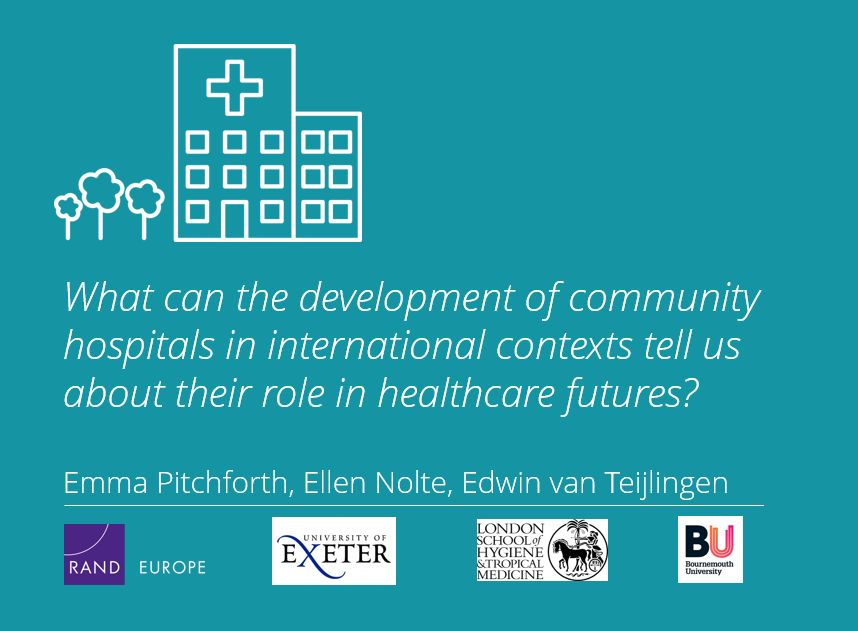 BU Visiting Faculty Dr. Emma Pitchforth (Senior Lecturer in Primary Care, University of Exeter) spoke this week at International insights: What can the development of community hospitals in international contexts tell us about their role in healthcare futures?, the first of three UK Community Hospital online seminars. Emma presented our NIHR study on Community Hospitals [1-3].
BU Visiting Faculty Dr. Emma Pitchforth (Senior Lecturer in Primary Care, University of Exeter) spoke this week at International insights: What can the development of community hospitals in international contexts tell us about their role in healthcare futures?, the first of three UK Community Hospital online seminars. Emma presented our NIHR study on Community Hospitals [1-3].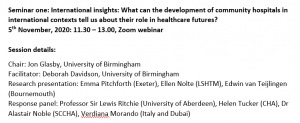 Community hospitals are a crucial but often neglected part of the health care systems in the UK. Community Hospitals are often very popular with local communities but they often face political challenges. COVID-19 has prompted us to make dramatic changes to way we think about and organise health care. Community hospitals have made a significant contribution to the health and wellbeing during the pandemic. The flexibility, resilience and strong community engagement typical of many community hospitals is being brought to the fore. At this critical time, questions are being asked about the future role of community hospitals and what lessons we can learn from other countries.
Community hospitals are a crucial but often neglected part of the health care systems in the UK. Community Hospitals are often very popular with local communities but they often face political challenges. COVID-19 has prompted us to make dramatic changes to way we think about and organise health care. Community hospitals have made a significant contribution to the health and wellbeing during the pandemic. The flexibility, resilience and strong community engagement typical of many community hospitals is being brought to the fore. At this critical time, questions are being asked about the future role of community hospitals and what lessons we can learn from other countries. The notion of a Community Hospital in the UK is evolving from the traditional model of a local hospital staffed by general practitioners and nurses and serving mainly rural populations. Along with the diversification of models, there is a renewed policy interest in community hospitals and their potential to deliver integrated care. However, there is a need to better understand the role of different models of community hospitals within the wider health economy and an opportunity to learn from experiences of other countries to inform this potential.
The notion of a Community Hospital in the UK is evolving from the traditional model of a local hospital staffed by general practitioners and nurses and serving mainly rural populations. Along with the diversification of models, there is a renewed policy interest in community hospitals and their potential to deliver integrated care. However, there is a need to better understand the role of different models of community hospitals within the wider health economy and an opportunity to learn from experiences of other countries to inform this potential.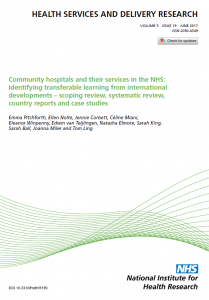
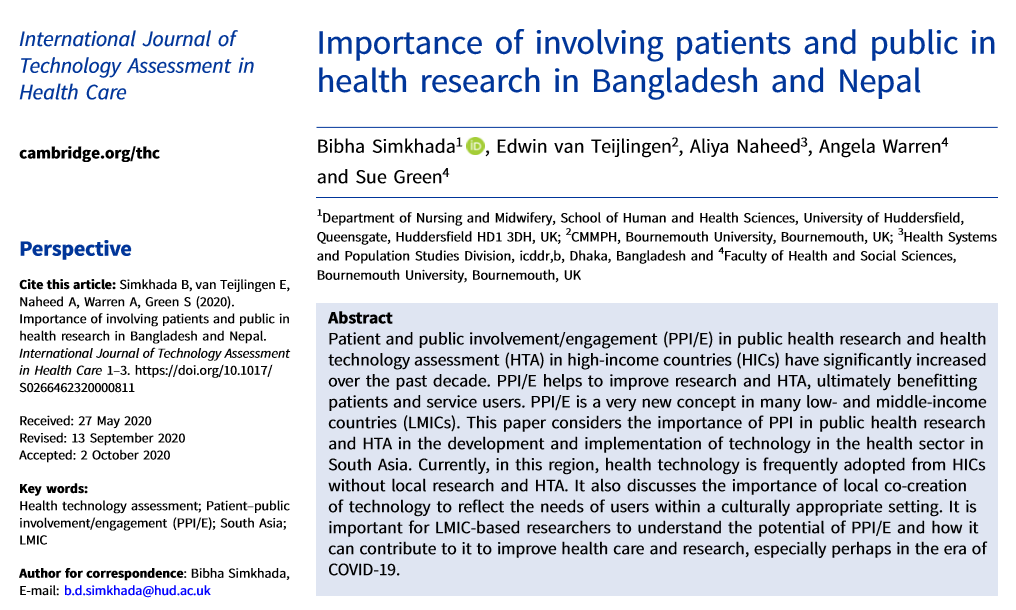

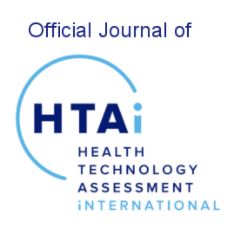



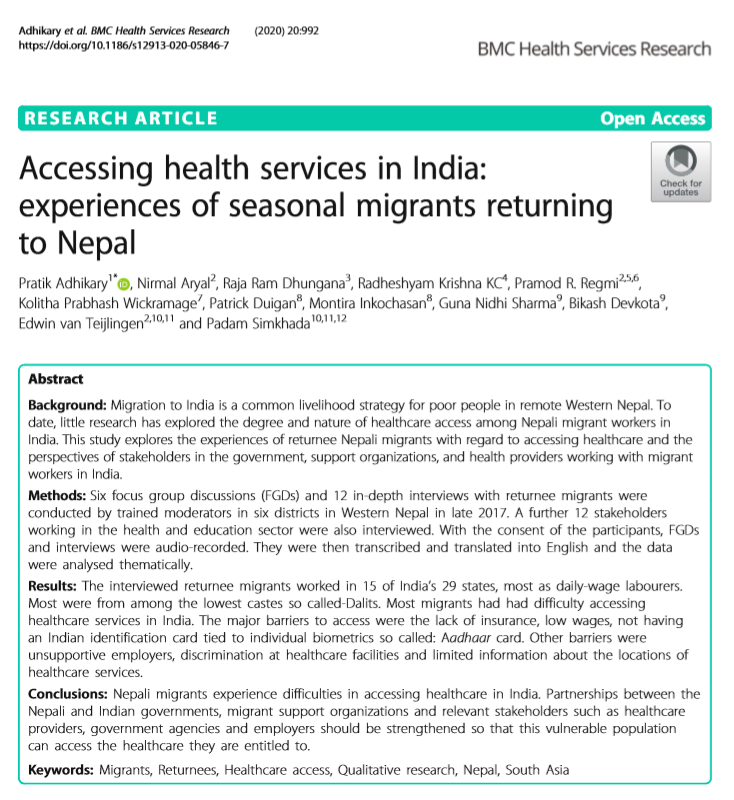



 Engagement: Bournemouth University), on 14th October 2020, undergraduate Psychology Students interacted with students from Symbiosis School of Liberal Arts (SSLA) engaged in the UNESCO Story Circles. This event was planned to provide an opportunity for the stude
Engagement: Bournemouth University), on 14th October 2020, undergraduate Psychology Students interacted with students from Symbiosis School of Liberal Arts (SSLA) engaged in the UNESCO Story Circles. This event was planned to provide an opportunity for the stude

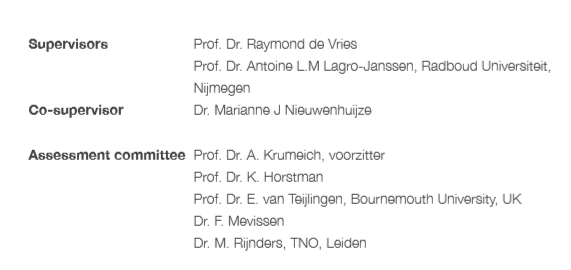
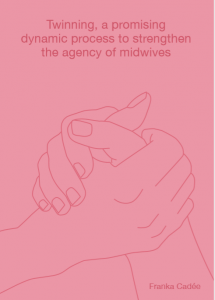

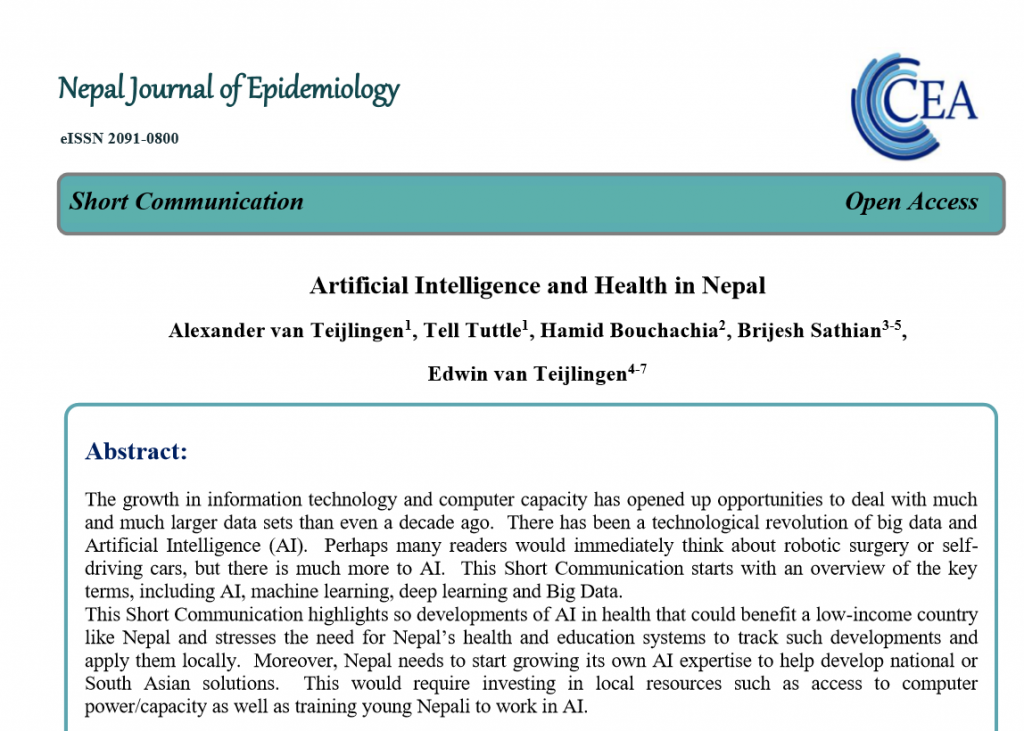
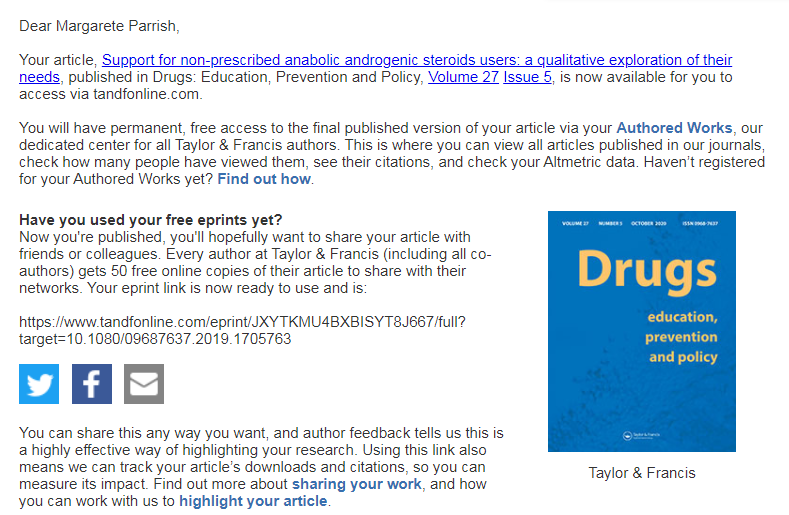












 SPROUT: From Sustainable Research to Sustainable Research Lives
SPROUT: From Sustainable Research to Sustainable Research Lives BRIAN upgrade and new look
BRIAN upgrade and new look Seeing the fruits of your labour in Bangladesh
Seeing the fruits of your labour in Bangladesh Exploring Embodied Research: Body Map Storytelling Workshop & Research Seminar
Exploring Embodied Research: Body Map Storytelling Workshop & Research Seminar Marking a Milestone: The Swash Channel Wreck Book Launch
Marking a Milestone: The Swash Channel Wreck Book Launch ECR Funding Open Call: Research Culture & Community Grant – Application Deadline Friday 12 December
ECR Funding Open Call: Research Culture & Community Grant – Application Deadline Friday 12 December MSCA Postdoctoral Fellowships 2025 Call
MSCA Postdoctoral Fellowships 2025 Call ERC Advanced Grant 2025 Webinar
ERC Advanced Grant 2025 Webinar Update on UKRO services
Update on UKRO services European research project exploring use of ‘virtual twins’ to better manage metabolic associated fatty liver disease
European research project exploring use of ‘virtual twins’ to better manage metabolic associated fatty liver disease